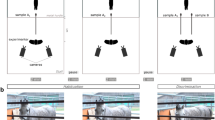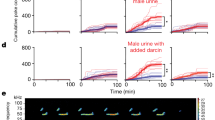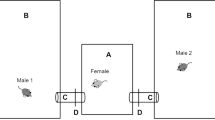Abstract
SMELL affects many aspects of the social and sexual behaviour of rodents1,2. For example, fighting in pairs of male mice is increased if one of the participants is made to smell unfamiliar by rubbing it with the urine of a strange male3. It has also been suggested that olfactory cues play an important part in mate choice4. In both rats5 and mice6, females which have been reared by artificially scented mothers have, when adult, been found to prefer males treated with this same scent to normal individuals. By contrast, Mainardi7 has found that female mice, reared in the presence of their fathers, later preferred to mate with males of a different strain. The difference between these two results may stem from the degree of strangeness involved, females preferring males which smell slightly unfamiliar rather than very familiar or totally strange. The results of the experiments using artificial odours suggest that early learning provides the yardstick by which unfamiliarity is judged5,6. Such a system may have an important role in assortative mating, enabling females given a choice to mate with those males by whom they are likely to conceive the best-adapted offspring. On this hypothesis females might be expected to prefer a small degree of unfamiliarity as an adaptation which minimises the chance of inbreeding. They might also be expected to reject males which smell very strange. At an extreme, this would avoid interspecific hybridisation, but it may also be disadvantageous within a species for very dissimilar individuals to mate as this would be likely to lead to the break-up of co-adapted gene complexes and thus the production of offspring of lower fitness8,9. We report here our examination of these predictions. Our data suggest that the olfactory preferences of female mice are consistent with this hypothesis.
This is a preview of subscription content, access via your institution
Access options
Subscribe to this journal
Receive 51 print issues and online access
$199.00 per year
only $3.90 per issue
Buy this article
- Purchase on Springer Link
- Instant access to full article PDF
Prices may be subject to local taxes which are calculated during checkout
Similar content being viewed by others
References
Whitten, W. K. in Advances in Reproductive Physiology Vol. 1, (ed. McLaren, A.) 155–177 (Academic, New York, 1966).
Bronson, F. H. in Pheromones (ed. Birch, M. C.) 344–365 (North-Holland, Amsterdam, 1974).
Mackintosh, J. H. & Grant, E. C. Z. Tierpsychol. 23, 584–587 (1966).
Doty, R. L. Psychol. Bull. 81, 159–172 (1974).
Marr, J. N. & Gardner, L. E. J. genet. Psychol. 107, 167–174 (1965).
Mainardi, D., Marsan, M. & Pasquali, A. Atti Soc. ital. Sci. nat. 104, 325–338 (1965).
Mainardi, D. Boll. Zool. 32, 1–6 (1965).
Nottebohm, F. Am. Nat. 106, 116–140 (1972).
Bateson, P. P. G. Nature 273, 000 (1978).
Yamazaki, K. et al. J. exp. Med. 144, 1324–1335 (1976).
Author information
Authors and Affiliations
Rights and permissions
About this article
Cite this article
GILDER, P., SLATER, P. Interest of mice in conspecific male odours is influenced by degree of kinship. Nature 274, 364–365 (1978). https://doi.org/10.1038/274364a0
Received:
Accepted:
Issue Date:
DOI: https://doi.org/10.1038/274364a0
This article is cited by
-
Analysis of behavioural discrimination mechanisms in a contact zone between two metacentric races of the house mouse,Mus musculus domesticus, in central Italy
Rendiconti Lincei (2004)
-
Paternally inherited HLA alleles are associated with women's choice of male odor
Nature Genetics (2002)
-
Interaction between strains in the social relations of inbred mice
Behavior Genetics (1989)
-
The ontogeny of sibling recognition in rodents: Superfamily muroidea
Behavior Genetics (1988)
-
Kin discrimination and reproductive behavior in muroid rodents
Behavior Genetics (1988)
Comments
By submitting a comment you agree to abide by our Terms and Community Guidelines. If you find something abusive or that does not comply with our terms or guidelines please flag it as inappropriate.



